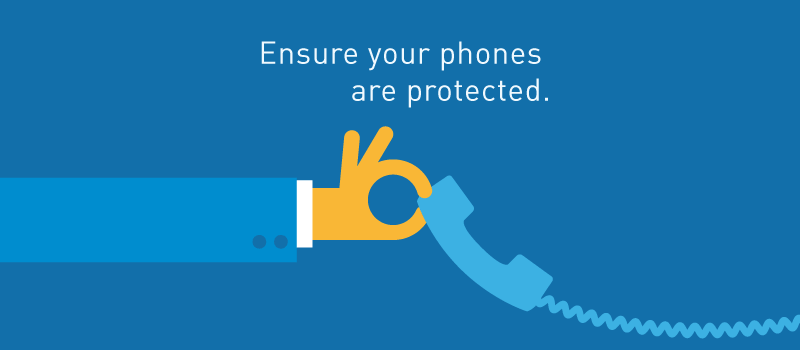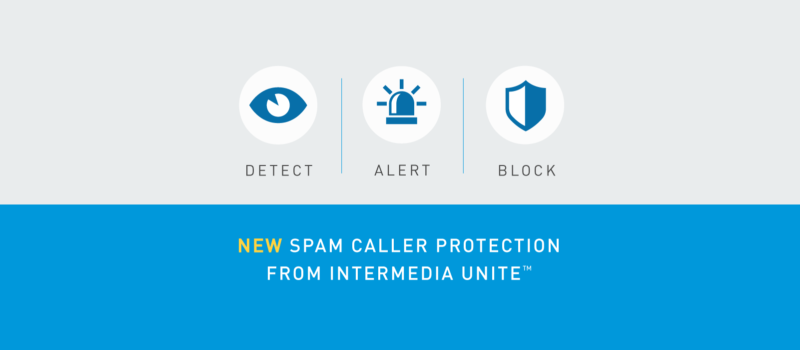Imagine opening your telecom bill and seeing line after line of fraudulent charges. Small businesses can receive such a nightmare when it comes to phone fraud. However, it’s not inevitable that it happens to you. Intermedia takes strong measures to prevent phone fraud, an area of loss that keeps growing.
Phone Fraud Cost Over $28 Billion in 2019
According to data from the Communications Fraud Control Association (CFCA), phone fraud amounted to $28.3 billion in 2019. The most common methods of fraud include:
- Robocalls: These are computerized auto-dialer calls made to subscribers. They leave pre-recorded messages to sell an illegitimate product or service or steal personal information from the subscriber.
- Wangiri: This scheme involves a scammer making a zero-duration call to a mobile device. The objective is to lure the subscriber into calling back to a high-rate number and rack up charges.
- Caller ID spoofing: A fraudster disguises a call by altering the caller ID information displayed to the call recipient.
- Short stopping: This describes when an operator takes over a call on their network before it reaches the intended destination, rerouting it to a high-rate destination.
- Call stretching: Recording a portion of a conversation before the call ends occurs. The B-side keeps the A-side on hold with an audio recording playing back continuously.
- Interconnect bypass: Scammers conceal and reroute high-rate traffic to exploit the difference between high and low interconnect rates for off-network and on-network calls.
- PBX hacking: A fraudster gains access to a business’s PBX system. Then the person generates a profit by making international calls at the business’s expense.
- Wangiri 2.0: Someone initiates callbacks from enterprises to high-rate numbers via submitting high-rate numbers to a company’s online contact form.
Communication providers and subscribers can both be victims of these types of phone fraud. The damages aren’t only the costs of these calls. They can also impact other processes, from impeding customer service agents to affecting the performance of marketing campaigns.
These threats are constant, and more fraud is arising daily, as scammers take advantage of things like hybrid work structures, which are creating more endpoints, and other pandemic fraud. Intermedia Unite has many features to protect its users from these risks and prevent phone fraud.
How Intermedia Prevents Phone Fraud
We take fraud seriously, and our Unite platform, a unified communications solution, has unique features to keep you safe.
Constant Network Monitoring
We regularly add checks and alarms for call volume that looks abnormal or differs from the previous history. Such an alarm will trigger a human review. If the evaluation fits our predefined fraud criteria, we automatically disable international calling and inform customers immediately.
Blocking High-Risk Areas
Certain geographic regions have a high risk of phone fraud. As a result, we proactively configure network-wide blocks for countries such as Nigeria, Congo, and Serbia unless you request otherwise.
Default Protections
We disable international calling for customers at the onset of service implementation. We will only change this if you request activation.
Configurable Calling Thresholds
If we enable international calling for your account by default, we limit calls to high-cost North American regions, such as Caribbean Islands. Additionally, there are limits to international countries of five per hour. Should you exceed this, we disable these functions as a precaution. However, you can reconfigure this setting if needed.
Billing Alarms
If your bill exceeds last month’s usage charges by 10 percent, we will automatically set off an alarm for review.
The Benefit of the Doubt
Should you become a victim of call fraud, you’re still protected. For the first occurrence, all customers receive a credit.
Spam Caller Protection
Phone fraud can occur due to spam calls as well. Intermedia includes spam caller protection. The functionality involves sophisticated detection tools. They can detect calls made by autodialers and recognize known spammers. The phone system will issue an alert to users before they answer it.
The protection is not just a blacklist. Rather, it’s a system that stops fraud before it occurs. This feature is standard with all Unite options.
More Security Standards from Intermedia
In addition to all these capabilities that protect against and prevent phone fraud, we have a robust stance on security. We’re SOC 3 audited, which demonstrates our ability to meet and exceed security best practices.
Our infrastructure protection is robust with multiple, redundant enterprise-class firewalls and intrusion protection systems (IPS). Our commitment to security continues to evolve as the threat landscape does. You can rely on our expertise to safeguard your entire communications platform.
If you have any specific questions about phone fraud or our security protocols, contact our support team at any time at 800-379-7729. You can also report any occurrences of fraud to our support agents.
Does Your Phone System Protect Against Fraud?
Now that you know the prevalence of phone fraud, you may wonder if you have the proper protections. It’s a good time to assess your provider’s prevention tactics and how they match up with the best practices we’ve outlined. It’s not something you want to take for granted because it can cost you considerably!
Get the protection you deserve on a communication platform that’s secure, user-friendly, and accessible from anywhere with Intermedia Unite. Take a tour of the solution today.
January 24, 2022
Explore other posts on these topics:


